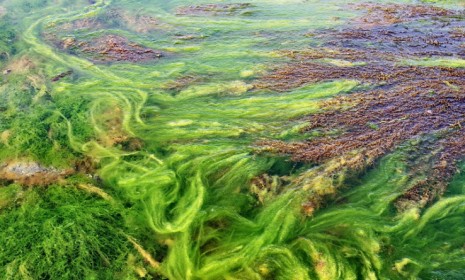The mutant bacteria that turns seaweed into fuel
Kelp is a desirable alternative to land-farmed biofuels, but scientists have had trouble harvesting it. Now, with specially outfitted E. coli, they may be able to

A free daily email with the biggest news stories of the day – and the best features from TheWeek.com
You are now subscribed
Your newsletter sign-up was successful
Experts have long hoped that the ocean's plentiful stores of seaweed could be turned into renewable biofuels. Now that goal is one step closer: Scientists have engineered a special bacteria to break down the previously inaccessible sugar in seaweed, which can then be transformed into biofuels similar to ethanol. Here's how they did it:
First off: Why seaweed?
Kelp is appealing as a fuel alternative for several reasons. Environmentally sustainable, it doesn't require farmland or freshwater to grow and it boasts a naturally high sugar content, says Wendy Koch at USA Today. And harvesting the ocean's plant life could produce considerable yields. "Cultivating seaweed along three percent of the world's coastlines, where kelp already grows, could produce 60 billion gallons of ethanol," says Wynne Parry at Live Science.
The Week
Escape your echo chamber. Get the facts behind the news, plus analysis from multiple perspectives.

Sign up for The Week's Free Newsletters
From our morning news briefing to a weekly Good News Newsletter, get the best of The Week delivered directly to your inbox.
From our morning news briefing to a weekly Good News Newsletter, get the best of The Week delivered directly to your inbox.
But why couldn't we harvest it before?
The problem, says Parry, is that one of its primary sugars, alginate, could not be "broken down efficiently enough to produce biofuel on an industrial scale" — until now. Alginate is used in everything from ice cream to textiles, but it "has proved difficult to break down and metabolize into fuel," notes Rachel Ehrenberg at Science News.
What changed?
Scientists from the Bio Architecture Lab headquartered in Berkeley, Calif., genetically engineered a special strain of E. coli bacteria capable of digesting the kelp's sugars into more accessible glucose. The new system is like a "Lego platform," says Parry, because the system's microbial components can be rearranged to produce different types of fuel, like butanol — "an alcohol like ethanol, which is blended into gas" — or even a biodiesel similar to conventional gas.
A free daily email with the biggest news stories of the day – and the best features from TheWeek.com
So what's next?
"Does this change everything? No," Chris Somerville, director of the Energy Biosciences Institute, tells Live Science. Farming seaweed on an industrial scale raises new industrial concerns, and the process will have to be refined until it's economically viable. What it offers, says Somerville, is "the beginning of opening up a new area."
Sources: Live Science, Science News, USA Today
-
 The Week Unwrapped: Do the Freemasons have too much sway in the police force?
The Week Unwrapped: Do the Freemasons have too much sway in the police force?Podcast Plus, what does the growing popularity of prediction markets mean for the future? And why are UK film and TV workers struggling?
-
 Properties of the week: pretty thatched cottages
Properties of the week: pretty thatched cottagesThe Week Recommends Featuring homes in West Sussex, Dorset and Suffolk
-
 The week’s best photos
The week’s best photosIn Pictures An explosive meal, a carnival of joy, and more